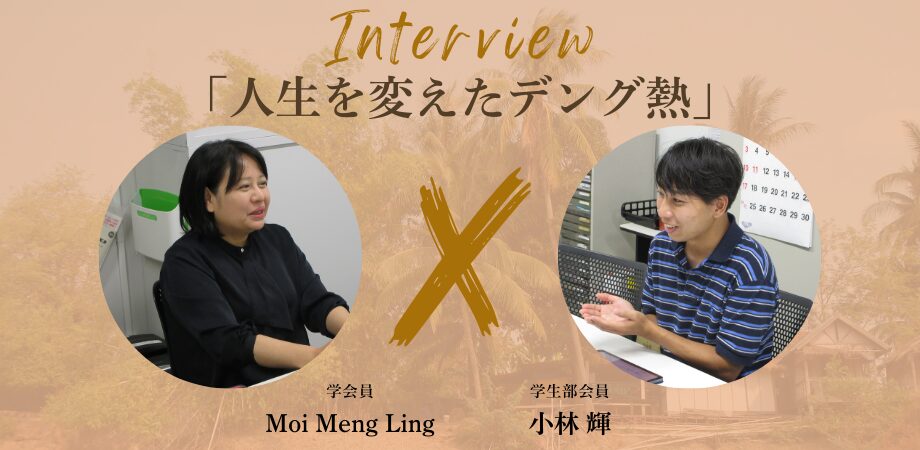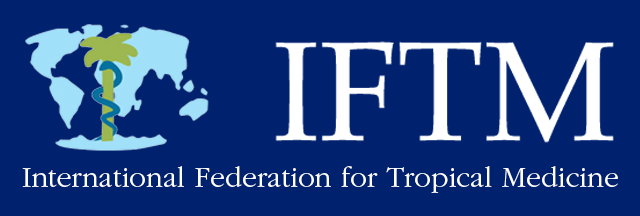
Balancing Research and Education
Kobayashi:
Could you tell us about the work you are currently doing?
Moi:
My specialties are molecular virology, infectious diseases, and vaccine science. I currently work as a graduate school professor, and I consider mentoring talented students one of my most important responsibilities. My research focuses on field studies of mosquito-borne diseases such as dengue and Zika, investigating patterns of outbreaks, understanding the mechanisms behind severe cases, and developing related vaccines and antibody-based therapeutics.
Kobayashi:
As a graduate school professor, what do you particularly emphasize when mentoring students?
Moi:
I am grateful that students choose to study with me with the aim of learning and growing. My guiding principle in research mentoring is to ensure that students become capable of independently writing research papers. Since the publication of first-author papers is a key measure of a researcher’s capabilities, I guide students carefully and strictly so that they can write and submit papers on their own. I also emphasize that “personal growth” is an essential skill for thriving in society. In lab guidance, I focus on identifying each student’s abilities, helping them select suitable research topics, and enhancing their technical expertise.
Kobayashi:
Managing students from different backgrounds must be challenging.
Moi:
Our lab has many international students, each with different educational and cultural backgrounds. While respecting these differences, I make sure to communicate the overall vision of the lab so that all students share a common sense of purpose as researchers. In the first group meeting after enrollment, I tell them that “research cannot be completed alone.” Over time, this fosters mutual respect, cooperation, and a shared sense of direction, creating a strong sense of unity. I consider this one of our lab’s strengths.

A Dengue Fever Experience that Changed My Life
Kobayashi:
What motivated you to pursue tropical medicine?
Moi:
The turning point came when I contracted dengue fever while studying at university in Malaysia. Dengue is a mosquito-borne viral infection that causes many deaths in Southeast Asia each year, and effective treatments are still lacking. I asked myself what I could do to contribute and, with a recommendation from the Japanese Embassy in Malaysia, I was accepted as a MEXT international student to study at the University of Tsukuba. This experience was pivotal in my decision to pursue tropical medicine as a career.
Kobayashi:
I understand you also conduct field research as part of your work. What exactly does that involve?
Moi:
In our lab, we conduct field surveys across Asia on mosquito-borne viral infections, mainly dengue and Zika, aiming to clarify their transmission patterns and human immune responses. These surveys are essential for designing public health measures to control outbreaks. We also analyze both humoral and cellular immunity after infection. Because dengue viruses have multiple serotypes, prior immunity may not protect against reinfection. To investigate this, I use antibody-dependent enhancement (ADE) assays to analyze neutralizing antibody function in detail. I originally developed this ADE assay at the National Institute of Infectious Diseases in Japan. It is now used in vaccine development at major research institutions in Japan, Vietnam, and Malaysia. Additionally, we measure viral loads in patients to study how they correlate with clinical severity. Through this research, I aim to better understand the mechanisms of dengue and contribute to the development of more effective treatments and vaccines.
Kobayashi:
Have there been any particular difficulties or challenges in field research?
Moi:
One challenge is not just collecting samples but building trust with local communities. Producing results is important, but we place equal value on human connections. In overseas fieldwork, collaboration with local healthcare workers and research teams is crucial. Building mutually beneficial relationships takes time, and ensuring that research results are returned to the local community is essential for earning trust. Maintaining these relationships is the most difficult yet critical aspect of our work. Without this human foundation, research and ultimately contributing to healthcare would be nearly impossible.
Kobayashi:
You’ve been in Japan for about 20 years. Why have you continued research here as a foreigner?
Moi:
Continuously producing high-quality research has earned me recognition and awards in Japan, making me a valued researcher even as a foreigner. Becoming a professor at any national university requires overcoming many hurdles—achievements, trust, and experience. At the University of Tokyo, promotion to full professor is particularly strict. Being accepted as a professor here is a great honor, and it also motivates me to contribute not only to the University but to Japan as a whole.
Developing Practical Vaccines
Kobayashi:
You are also involved in vaccine research. What are your thoughts on the future of vaccines for diseases like dengue?
Moi:
Vaccines will need continuous improvement. Takeda Pharmaceutical has developed a recombinant virus vaccine covering all four serotypes, which will likely be the first to be widely administered and evaluated. Future vaccines must be even more effective. I believe that mRNA and other new technologies may help achieve this goal.
Kobayashi:
I understand dengue vaccine development is difficult due to ADE.
Moi:
Yes. Around 2015, a large-scale vaccination program in the Philippines resulted in some vaccinated individuals developing severe dengue. This highlights the risk of vaccines potentially enhancing infection, making development challenging. Takeda’s vaccine now provides an opportunity to evaluate safety and efficacy, and the next step is to develop vaccines that overcome these limitations.
Kobayashi:
I’ve heard that some vaccines are available for people who have already been infected. Are there efforts to develop vaccines for those who have never been infected?
Moi:
Ideally, vaccines should be available regardless of prior infection. Testing everyone for antibodies beforehand is impractical. Future vaccine development must aim for universal administration.
Kobayashi:
Currently, mosquito nets and physical barriers are the primary preventive measures, correct?
Moi:
Yes. With no effective treatments, preventing mosquito bites is the most important measure. While tourists may use repellents, residents in endemic regions rely on cost-effective methods like mosquito coils. Maintaining traditional mosquito control practices remains essential.

Kobayashi:
What are your future goals and aspirations?
Moi:
I aim to advance beyond studying the virus itself and contribute to developing practical vaccines. We are focusing on vaccines that enhance cellular immunity as well as antibody-mediated immunity, aiming for a balanced immune response rather than simply inducing antibodies.
Kobayashi:
Finally, do you have any advice for students studying tropical medicine?
Moi:
It is impossible to discuss becoming a tropical medicine or global health researcher without recognizing the contributions of Dr. Hideyo Noguchi, who risked his life studying mosquito-borne infections in Africa. Young Japanese researchers should actively engage in international work. Research methods, environments, and communities vary across countries, and interacting with diverse researchers broadens one’s perspective.
Learning is lifelong. Don’t limit yourself based on what you know, don’t know, or think is useful. Keeping an open mind and learning continuously is essential for growth as a researcher, and for contributing to the advancement of tropical medicine.

Profile of Interview Participants
Dr. Moi Meng Ling
Professor, Department of International Health, Graduate School of Medicine, The University of Tokyo; Chair, International Biomedical Sciences Division, Developmental Medical Science. Born in Malaysia. Contracted dengue fever during university, which led to research on mosquito-borne viral infections such as dengue, Zika, and chikungunya, and related vaccine development. B.Sc., University of Putra, Malaysia (2002); Japanese Government Scholarship (MEXT) student, University of Tsukuba (2003); Ph.D., Graduate School of Comprehensive Human Sciences, University of Tsukuba (2010). Former positions include National Institute of Infectious Diseases (Japan), Associate Professor at Nagasaki University, and current position since 2021.
Hikaru Kobayashi
Second-year medical student, Nagasaki University. From Nagano Prefecture. Interested in healthcare in developing countries since junior high school. Member of the university soccer club and the Tropical Medicine Research Society. Motivated to study all courses seriously, influenced by conversations with doctors and researchers about how past learning impacts current work.

